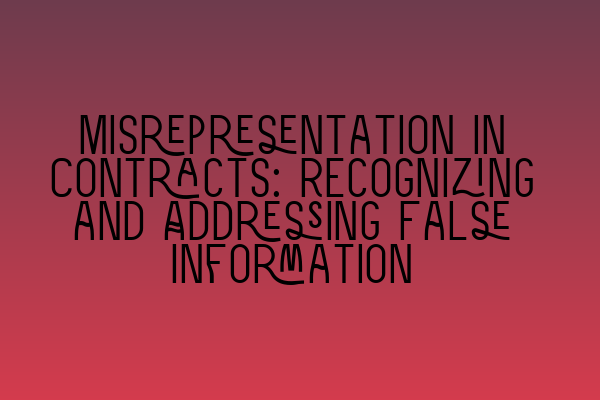Misrepresentation in Contracts: Recognizing and Addressing False Information
Misrepresentation is a common issue that arises in contract law, where one party provides false or misleading information that influences the other party’s decision to enter into a contract. It is important for individuals and businesses to be aware of the implications of misrepresentation and understand how to recognize and address it to protect their rights and interests. In this article, we will explore the concept of misrepresentation, discuss the different types of misrepresentation, and provide guidance on how to deal with it effectively.
Before diving into the specifics, it is essential to understand what misrepresentation means. Misrepresentation occurs when one party makes a false statement of fact, either verbally or in writing, to the other party, inducing them to enter into a contract. The false statement can be regarding any material fact, such as the quality, quantity, or condition of a product or service. When a misleading statement is made, the relying party may suffer financial loss or damage as a result.
There are three main types of misrepresentation: innocent, negligent, and fraudulent. Innocent misrepresentation happens when a false statement is made genuinely, without any intent to deceive. Negligent misrepresentation occurs when a party makes a false statement without exercising reasonable care to ensure its accuracy. Fraudulent misrepresentation is the most serious type, where a party knowingly makes a false statement with the intention to deceive and induce the other party into the contract.
Now that we understand the different types of misrepresentation, let’s discuss how to recognize it. It is crucial to conduct due diligence and thoroughly review all information provided by the other party before entering into a contract. Look for any inconsistencies, discrepancies, or suspicious claims. If something seems too good to be true, it probably is. If you suspect misrepresentation, seek legal advice to assess the situation and determine the appropriate course of action.
When faced with misrepresentation, it is important to address it promptly and effectively. The first step is to gather evidence to support your claim. This can include documentation, correspondence, witness statements, or any other relevant information that proves the other party made a false statement. Keeping detailed records and preserving all communication is essential in establishing your case.
Next, consider opening a dialogue with the other party to discuss the issue and attempt to resolve it amicably. This can involve renegotiating the terms of the contract or seeking compensation for any losses suffered. If the other party is unwilling to cooperate, you may need to escalate the matter by involving a solicitor or considering legal action.
Navigating legal challenges like misrepresentation can be complex, which is why it is essential to seek professional advice. A solicitor specializing in contract law can provide valuable guidance and support throughout the process. They can assess the merits of your case, assist with negotiation, and represent your interests in court if necessary.
As solicitors, we understand the intricacies of contract law and the importance of addressing misrepresentation effectively. Our team at SQE Contract Law has a wealth of experience in dealing with contractual disputes and can provide you with the expertise needed to protect your rights. Contact us today for a consultation to discuss your situation and explore your options.
To learn more about other legal challenges and pitfalls that may arise in your practice, check out our article on “Navigating Legal Challenges and Pitfalls in Your Practice”. If you are interested in understanding the difference between a barrister and a solicitor, we have a comprehensive comparison article available for you: “Barrister vs. Solicitor: A Comprehensive Comparison”. The SRA Competence Statement is also an important aspect for all solicitors, so make sure to read our guide on “Understanding the SRA Competence Statement: A Guide for Solicitors”. Additionally, if you are considering specializing in a particular area of law, our article on “Exploring Different Solicitor Specializations: Finding Your Niche” can provide valuable insights. Lastly, if you are looking for the top law schools in the UK, our article on “Top Recommendations for Law Schools in the UK” can help you make an informed decision.
Remember, being aware of misrepresentation and understanding how to effectively address it is crucial in protecting your interests as a party to a contract. Stay informed, seek professional advice when needed, and ensure that you enter into contracts based on accurate and reliable information.
